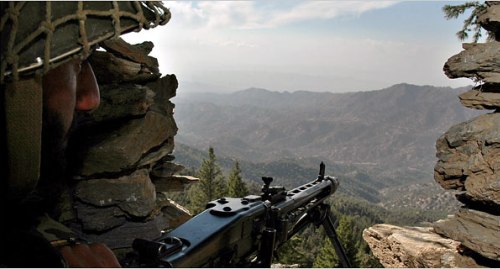The massive bombing of the Islamabad Marriott has deeply shaken Pakistan, offering the newly elected civilian leadership a strategic opportunity to aggressively pursue the Islamic militants that threaten the country’s viability and territorial integrity. After alienating Pakistanis with counterproductive military action against militants on the Pakistani side of the Durand line, Washington must now play a different game if it wishes to help its besieged ally. Islamabad is showing signs of a newfound resolve to decisively defeat the militants, but the government will only succeed in maintaining public support for this difficult task if the US offers Pakistan political space to take ownership of the fight and a concrete improvement in its counterinsurgency capacity.
Anti-American sentiment in Pakistan is very high. A deep mistrust poisons US-Pakistan relations, as explained by Shuja Nawaz in a previous post. For too long, Pakistanis believed they were fighting America’s war, in part because President Musharraf told them as much. For its part, the American government has long mistrusted Pakistan’s commitment to clamping down on Afghan Taliban and al Qaeda operatives on their soil. Nothing better demonstrates Washington’s attitude than the Bush administration’s decision to authorize special operations raids on Pakistani territory without Islamabad’s approval. Senior Bush administration officials doubted that Pakistan had the capability to hunt down Islamic extremists operating with impunity along the Afghan border. Worse still, many believe that Pakistan’s intelligence services have maintained long-standing ties with the Afghan Taliban for a variety of reasons.
Pakistan’s two-faced game with the militants emboldened the Afghan insurgency and complicated the US and NATO task of pacifying and rebuilding that country. Unable to tolerate the upsurge in violence in Afghanistan and the existence of an al Qaeda sanctuary in Pakistan, the US launched a Special Forces raid and a series of missile attacks on Pakistani territory late this summer. Predictably, the Pakistani government and people reacted with outrage, with Army Chief of Staff General Asfhaq Kiyani warning that Pakistan would defend its sovereignty “at all costs.” US-Pakistan relations seemed to be in tailspin, with the militants gaining from the downward spiral in political relations between the erstwhile allies.
Saturday’s massive terrorist attack in Islamabad – at face value a major operational success for the terrorists – may in the long run emerge as a moment of strategic overreach for al Qaeda and its Taliban allies. Coming on the heels of the humiliating US raids and Kiyani’s declaration that only Pakistan can effectively fight the militants, the attack may have finally motivated the Pakistani army to put its money where its mouth is. Monday, they reportedly killed sixty militants in a ramped up campaign in the northwestern section of the country.
According to an analysis by Ismail Khan and Carlotta Gall in the IHT, Pakistani security analysts have been taken aback by the capabilities and fortifications of the militants, who are far more sophisticated and organized than previously believed. The article asserts that Pakistani civilian and military officials are determined to finish the fight against the militants and have no wish for another unenforceable cease–fire that leaves the militants with the upper hand.
If this is true – which history demonstrates is a big ‘if’ – it could not come at a better time for Pakistan. Newly elected President Asif Zardari must act decisively against the militant threat to strengthen his weak hand in his country’s fragile return to democracy. Pakistan faces a series of simultaneous crises, including the questionable competence and integrity of the Zardari-Gilani government. Regardless, the civilian government will almost assuredly fail in bringing prosperity, democratic governance, and security to the country if it does not aggressively attack the Islamic militants.
Pakistan has stared into the abyss, symbolized by the forty-foot deep bomb crater in front of the scarred Marriott. Not even a year after Benazir Bhutto’s assassination by Islamic militants in Rawalpindi, reports are emerging that Pakistan’s president and prime minister only escaped a similar fate thanks to a last minute plan to dine at the latter’s residence instead of the Marriott. Pakistan must act before tragedy strikes again, but it can only act effectively if the US offers political space and allows Pakistan to take ownership over its fight.
Pakistan has insisted that only it can win this fight. It is time to back up these words with decisive action. Senior officials must use the barbarity of this attack to convince the Pakistani public and junior officers in the army of the need to apply greater pressure on the militants in the FATA and the NWFP.
However, Pakistan should not labor alone. The US can help remove Pakistan’s excuses for not taking determined action by holding off on cross border strikes of minimal strategic value and providing Pakistan with the tools it needs to succeed, including intensified counterinsurgency training, modern attack helicopters, and better night vision equipment.
Regionally, Washington should support Afghan Defense Minister Wardak’s proposal for a joint Afghan-Pakistan border guard with US participation as a means of attacking the cross-border militants with the regional approach the problem demands and embrace Turkey’s leadership in offering to host senior Afghan and Pakistani officials to reduce tensions and increase cooperation between the two neighbors. Finally, a stronger commitment by the US, NATO, and the EU to the ISAF mission in Afghanistan will further signal to skeptical Pakistanis that the international community is committed to Afghanistan’s stability for the long haul.
Pakistan will need all the constructive outside help it can get to take back the future of its country, but it will all be for naught if Pakistanis do not make this struggle their own. Pakistan’s future hangs in the balance. Let us hope the Pakistani government and people will find that worth fighting for.
Jeff Lightfoot is an assistant director of the International Security Program at the Atlantic Council.
Image: 27pakistan.600.jpg
